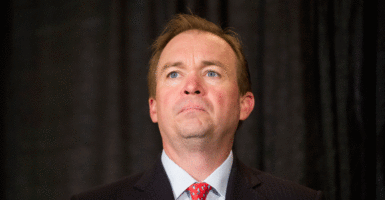President-elect Donald Trump chose one of the most outspoken fiscal conservatives in Congress, Rep. Mick Mulvaney, to be director of the Office of Management and Budget.
Mulvaney, a South Carolina Republican, is a founding member of the House Freedom Caucus, the most conservative group in Congress. He has pushed to cut both domestic and defense spending since being elected to the House in 2010 as part of the tea party wave.
“It is a great honor to be appointed director of the Office of Management and Budget,” Mulvaney said in a statement. “The Trump administration will restore budgetary and fiscal sanity back in Washington after eight years of an out-of-control, tax-and-spend financial agenda, and will work with Congress to create policies that will be friendly to American workers and businesses.”
If the Senate confirms Mulvaney, 49, as budget director, he will help shepherd Trump’s agenda through Congress, including drafting the president’s first budget, guiding repeal of Obamacare, enacting tax reform, and potentially, passing a major infrastructure spending package.
“We are going to do great things for the American people with Mick Mulvaney leading the Office of Management and Budget,” Trump said in a statement. “Right now we are nearly $20 trillion in debt, but Mick is a very high-energy leader with deep convictions for how to responsibly manage our nation’s finances and save our country from drowning in red ink.”
Here are four things to know about Mulvaney.
1. Not Afraid to Fight the Establishment
In 2011, as the U.S. was on the brink of default, Mulvaney voted against raising the debt ceiling, insisting that its passage be paired with “Cut, Cap and Balance,” a measure that would have slashed spending and imposed a constitutional amendment to balance the budget.
He also helped lead an effort to defund Obamacare that resulted in a 16-day government shutdown in 2013.
At the start of his second term in 2013, Mulvaney declined to support the re-election of then-House Speaker John Boehner, abstaining from the vote in protest.
2. Founder of the Freedom Caucus
After he lost his campaign in 2014 to become chairman of the Republican Study Committee—the largest group of House Republicans—Mulvaney helped organize a splinter group, the Freedom Caucus, to push the chamber further to the right.
The Freedom Caucus attracted national attention in 2015 when it pushed Boehner into early retirement.
As budget director, Mulvaney will be a key figure in repealing federal regulations implemented by the Obama administration.
Recently, the Freedom Caucus released a list of 232 regulations that it wants Trump to repeal, including ones dealing with climate change, nutrition, immigration, labor, and energy.
3. Willingness to Work With Leadership, Democrats
Mulvaney has allied with Republican leaders and Democrats on some issues.
On defense issues, he has opposed the use of a separate war funding account known as overseas contingency operations, a budgetary maneuver used to avoid spending caps to fund military and anti-terror operations abroad, such as the military campaign against ISIS.
He’s called the account a “slush fund.” Trump, meanwhile, has promised to invest more in the military and escalate the fight against ISIS.
Mulvaney, who speaks Spanish, has also worked on immigration reform, and he said that he supports legal status for some of the estimated 11 million immigrants living in the U.S. illegally.
He’s friendly with House Speaker Paul Ryan, R-Wis., and was among three members who gave nominating speeches for Ryan in the House GOP leadership election last month.
During his run for Republican Study Committee chairman, Mulvaney told The Daily Signal how he balances his rabble-rousing instincts with dealmaking on issues he cares about.
“I don’t think it’s the role of the RSC chair to be a shill for leadership,” Mulvaney said. “This is not a leadership position. This is separate and apart from that. So I think it’s incumbent upon the chairman to walk that fine line between working with leadership sometimes and pushing back at them at others. And I think I’ve shown the ability to do that. You have to have that credibility. What’s the best way to move the larger conference to the right?”
4. Personal, Professional Background
Mulvaney serves on the Financial Services Committee and the Oversight and Government Reform Committee. He first entered politics in 2006, when he was elected to the South Carolina House. Before that, he was a private-practice lawyer and businessman, working in his family’s home-building business, and helping run a regional restaurant chain.
Mulvaney has a degree in international economics from Georgetown University and a law degree from the University of North Carolina at Chapel Hill.
He was born in Alexandria, Virginia, but grew up in Charlotte, North Carolina, before moving to South Carolina.
His House office is decorated with South Carolina sports memorabilia. Mulvaney is Roman Catholic. He is married with three children, a set of triplets.





























